So much of your job performance is impacted by the environment you’re in, the people you’re surrounded with, and the passion you bring to your work. While science confirms these external factors play key roles in our ability to focus better and reach our goals, a recent study suggests that a whole other aspect of our lives can impair our work ethic behind the scenes: late-night social media use.
The study, published in the journal Sleep Health, explored the nighttime habits of 112 players from the NBA, and merged two public datasets to measure the correlation between the players’ nighttime activity on Twitter, and their performance the following day. They found that players who tweeted between 11 p.m. and 7 a.m. the night before game day scored fewer points and had fewer rebounds — likely because of their social media use before bed. “Our findings suggest that acute sleep deprivation, as measured via late-night Twitter activity, is associated with changes in next-day game performance,” the researchers concluded. “More broadly, the use of late-night social media activity may serve as a useful general proxy for sleep deprivation in other social, occupational, and physical performance-based contexts.”
The results have implications beyond the Twitter habits of NBA players, and the researchers want their findings to serve as a reminder that our late-night screen time can affect non-athletes across industries. “Our study is not limited to the implications of Twitter — nor is it limited to the effects of sleep loss on athletic performance,” Lauren Hale, Ph.D., one of the lead study authors and a public health professor at Stony Brook University’s Renaissance School of Medicine, tells Thrive. “We hope that children, parents, athletes, and non-athletes alike can learn from this study to put their mobile devices away and prioritize their sleep health.”
Hale notes that sleep loss has real consequences for optimal next-day functioning, and when that sleep loss comes from time spent on social media, the combination can impede on our cognitive abilities and productivity at work. To make sure you’re functioning your best at the office, here are three small steps you can take to both sleep better, and work smarter:
Set a time to clear your bedroom of technology
If you find that you have a hard time putting your phone away once you get into bed, pick a consistent time each night to escort your phone out of your bedroom completely. Studies show that the blue light emitted from our devices can suppress the melatonin that our bodies need to fall into a restful sleep, so eliminating that light before bed can help set you up for more restful, high-quality sleep.
Write down what’s on your mind
Instead of spending the last few minutes before bed scrolling through social media, try writing down whatever is flooding your mind at that moment — whether it is tomorrow’s to-do list, or a few thoughts from your day at work. Some of the most successful people swear by this nighttime ritual, and it’s been proven to improve sleep quality, and help your mind unwind at the end of the day.
Give yourself permission to reallocate your time
It’s not always possible to get quality sleep every night, so on the days where you’re a little less focused, it’s OK to take a step back and reorganize your tasks accordingly. Researchers call this strategy ”purposeful procrastination,” and it’s not a sign of laziness, but rather, a way to prompt your brain to see the task differently, and return to it when you’re ready. If you’re not in the most optimal headspace to do your more focused work, decide what needs to be done right away, and what can be done tomorrow.
Follow us here and subscribe here for all the latest news on how you can keep Thriving.
Stay up to date or catch-up on all our podcasts with Arianna Huffington here.


